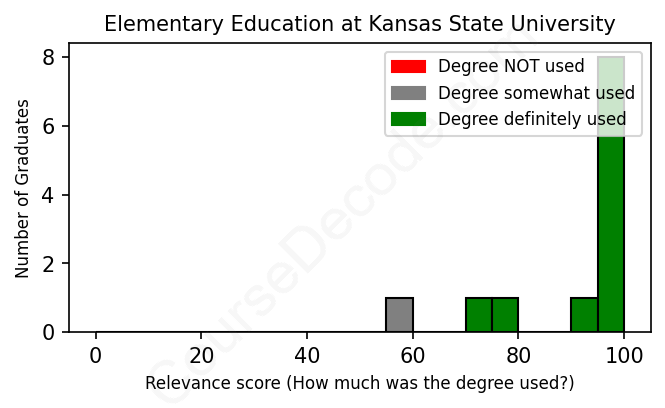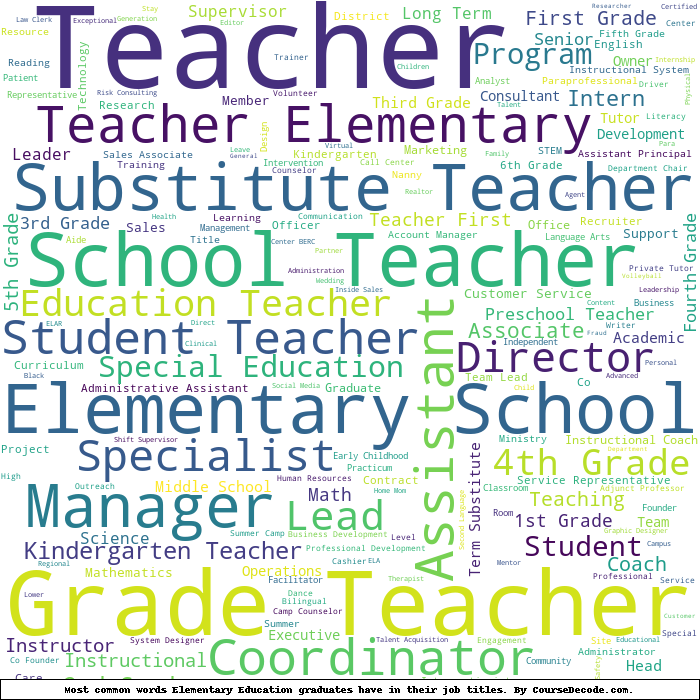
First, some facts. Of the Elementary Education graduates from Kansas State University we've analyzed , here's how many have used (or NOT used) their degree in their career:

These are estimates based on AI analysis of 12 LinkedIn profiles (see below).
The verdict? Great! Overall, with an average relevance score of 91%, Elementary Education graduates from Kansas State University have a substantially higher likelihood (+24%) of finding work in this field compared to the average graduate across all fields:
And for comparison, here's the chart for all profiles we've looked at across all degrees.
Also, after graduating, 50% of these graduates have pursued further education other than another Bachelor's degree (such as a Masters degree or other), compared to the average across all profiles of 35%. This suggests you may need more than just a Bachelors degree to be competitive as a Elementary Education graduate.
See the details:
|
Relevance score: 100% We think this person has gone into a career highly relevant to their degree. We think this person has gone into a career highly relevant to their degree.
DEGREE INFOGraduated in 2013 from Kansas State University with a Bachelor of Science - BS in Elementary Education. Also pursued further education since (see below). JOB HISTORY SINCE GRADUATIONSecond Grade Teacher Seitz Elementary School Aug 2013 - May 2015 Fourth Grade Teacher  The Independent School - Wichita, KS Aug 2018 - May 2019 Third Grade Teacher  The Independent School - Wichita, KS Aug 2015 - Jun 2022 Lower School Lead Teacher  The Independent School - Wichita, KS Aug 2021 - Jun 2022 Head of Lower School  The Independent School - Wichita, KS Jun 2022 - Present FURTHER DEGREES DONE SINCE GRADUATINGMaster of Arts - MAFriends University 2013 - 2015 ABOUTNo information provided. |
The top 10 most common jobs done by the graduates we've analyzed (ranked most common to least) are:
Based on the profiles from LinkedIn, it's pretty clear that most alumni from the Elementary Education program at Kansas State University have pursued roles that are directly related to elementary teaching. The most common job titles include Kindergarten, First, Second, Third, Fourth, and Fifth Grade Teachers. These positions utilize the skills and knowledge from their degrees on a daily basis, focusing on educating young children, managing classrooms, and applying various instructional strategies. For instance, many individuals have seamlessly transitioned from teaching one grade to another, and roles like Lower School Lead Teacher and Head of Lower School even show that some have taken their experience into leadership positions within education.
However, not every job is strictly relevant to Elementary Education. There are a few instances where graduates have taken on roles outside of traditional teaching, like working as a Recruiter or an Event Planner. While these jobs might involve some transferable skills, they don't really apply the core competencies obtained from their degrees. Overall, the vast majority of the roles analyzed are strongly aligned with what they studied, suggesting that Kansas State does a solid job preparing its graduates for careers directly in education.
Here is a visual representation of the most common words in job titles for Elementary Education graduates (this is across all Elementary Education graduates we've analyzed, not just those who went to Kansas State University):

Looking at the career paths of graduates from Kansas State University's Elementary Education program, it seems that most of them start off in pretty traditional roles within the education sector. Many of them secured their first jobs as classroom teachers right after graduation, usually taking on grades like kindergarten, first grade, or second grade. For example, graduates from 2010 and 2013 found themselves in teaching roles almost immediately, and some even grew into leadership positions, such as the Head of Lower School. It's evident that the majority of these alumni embraced opportunities within elementary education right at the start of their careers.
As we look further down the line, about 5 to 10 years post-graduation, some have remained in teaching while others have diversified their roles within the education field. A few have taken on more significant responsibilities, like becoming team leaders or curriculum developers, which shows a natural progression in their careers. However, there are also some instances where individuals seemed to step away from direct classroom roles—like one graduate who shifted to a recruiter position or another who became an event planner. Overall, many graduates stayed within the education system, taking on various teaching roles or moving into related areas, which suggests a strong link to their initial training in elementary education.
Getting a Bachelor’s degree in Elementary Education at Kansas State University or anywhere else is kind of a mixed bag. It’s definitely a lot of work—you're looking at not just taking classes, but also doing a lot of hands-on stuff like student teaching and lesson planning, which can be pretty time-consuming and challenging. Some people find it easier than other degrees since many of the subjects are relatable and geared toward working with kids, but it can also be tough in terms of keeping up with assignments, projects, and field experiences. So, I’d say it’s about average in terms of difficulty, but if you’ve got a passion for teaching and connecting with young kids, it can feel more rewarding than draining!
Most commonly, in the LinkedIn profiles we've looked at, it takes people 4 years to finish a Bachelor degree in Elementary Education.
So, looking at these Kansas State University grads, it seems like they're mainly sticking with teaching jobs, which aren’t usually known for being super high-paying. Many of them have moved up the ranks to leadership roles or switched schools, but honestly, unless they've landed some sweet admin positions or taken on specialized roles, their salaries might not be that impressive given how long they’ve been working. For instance, teachers often start around $30k-$40k, and it tends to increase incrementally. Even with some having leadership roles, it’s likely that most are making a comfortable living but not exactly rolling in cash, especially considering the cost of living in some areas. So, if you’re looking to strike it rich, teaching might not be the best bet, but it's definitely rewarding in other ways!
Here is a visual representation of the most common words seen in the "about" section of LinkedIn profiles who have a Bachelor degree in Elementary Education (this is across all Elementary Education graduates we've analyzed, not just those who went to Kansas State University). This may or may not be useful:

Here are all colleges offering a Bachelor degree in Elementary Education (ordered by the average relevance score of their Elementary Education graduates, best to worst) where we have analyzed at least 10 of their graduates: